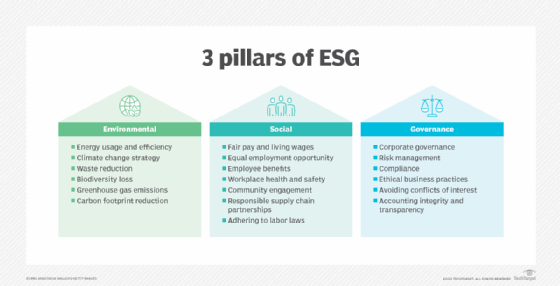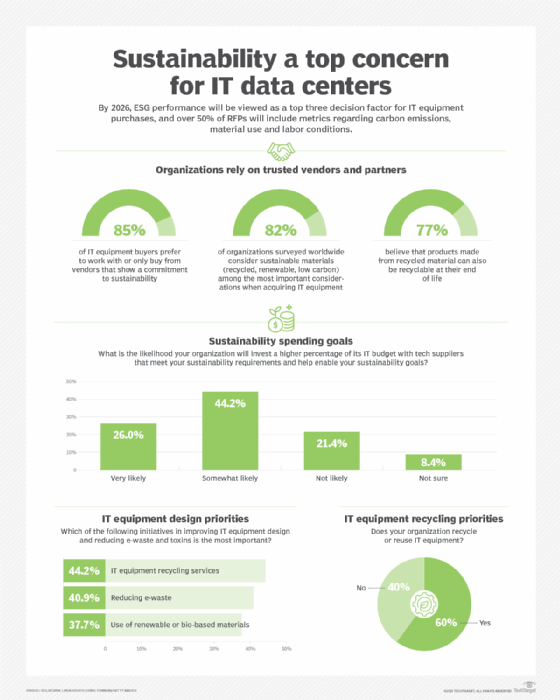What is an ESG score?
An ESG score is a way to assign a quantitative metric, such as a numerical score or letter rating, to the environmental, social and governance (ESG) efforts of an organization.
ESG efforts have become increasingly important as awareness around the topic has grown. There are numerous ESG benefits for businesses that get it right, including providing competitive advantage, attracting investors, improving financial performance, building customer loyalty and helping to make a company's operations sustainable. An ESG score, also sometimes referred to as an ESG rating, is a way to measure how an organization is executing its ESG goals.
An organization's score includes a variety of ESG metrics that span environmental sustainability, human resources practices, business ethics, social responsibility and overall corporate governance concerns. Investors, analysts and other stakeholders use ESG scores to assess the risk and opportunities associated with a company's practices. Comparing ESG scores can help identify areas where companies can improve their sustainability and ethical practices. They also let users benchmark an organization against competitors within the same industry or sector.
What are the 3 pillars of ESG?
There are three pillars that contribute to the overall ESG score. They each look at specific ESG factors or metrics:
- Environmental issues. The environmental pillar is concerned with an organization's waste management and pollution mitigation efforts, as well as energy efficiency, carbon emissions, water consumption and climate change initiatives, among other factors.
- Social issues. The social pillar is concerned with factors such as an organization's health and safety protocols, human rights and fair labor practices, workforce diversity and relationships with surrounding communities.
- Governance issues. The governance pillar looks at a corporate structure and assesses board member representation, fair compensation, business and financial ethics as well as risk management practices.

Why are ESG scores important to companies?
ESG scores can aid with overall corporate governance and company management, and are important to companies for the following reasons:
- Validation. ESG scores provide a way for an organization to validate its ESG-related efforts. The score provides a publicly disclosed metric based on the organization's initiatives.
- Peer comparison. ESG scores let organizations and their investors compare one company against another.
- Benchmarking. Beyond comparing vendors, an ESG score enables broader industry benchmarking to understand how a specific industry vertical scores and where different companies fall within the results.
- Managing progress. With an ESG score in hand, a company can better manage and measure progress using a quantitative metric.
- Investor attraction. An ESG score provides investors with an attribute that can help them make ethical, sustainable investing decisions.
- Risk management. An ESG score can help identify areas of potential concern and risk from an ESG perspective.

Who calculates and provides ESG scores?
Calculating ESG scores is a complex task with multiple third-party providers offering services. Some organizations use their own internal scoring process often based on a standardized framework such as the Global Reporting Initiative (GRI) or the Task Force on Climate-related Financial Disclosures (TCFD), as well as self-analysis. The factors in an internal scoring process can mimic those of third-party vendors. These include data collection on ESG goals and a numerical score or letter grade given for progress toward the goal.
This article is part of
ESG strategy and management guide for businesses
Examples of providers of ESG scores and ratings based on TechTarget research are the following:
- Bloomberg ESG Data. Bloomberg's scoring comes from a combination of its own direct sources, as well as data from MSCI and Sustainalytics.
- Fitch Ratings. Fitch Ratings uses its own proprietary scoring system that ties an ESG score to credit rating decisions.
- Institutional Shareholder Services. ISS ESG service provides insight into the financial material information that can be contained in what's normally nonfinancial ESG disclosures.
- LSEG (formerly Refinitiv). LSEG has its roots in Thomson Reuters ESG Scores and provides environmental, social and governance scores for global companies based on publicly reported data.
- Moody's. Formerly known as Vigeo Eiris, Moody's ESG service provides scores and assessment of ESG initiatives. Moody's is well known in the financial services market for its bond rating services.
- MSCI. This service uses a rules-based methodology that identifies the key issues, risks and opportunities facing an organization within the context of its industry vertical. MSCI is one of the most widely used vendors for ESG scores, claiming to rate approximately 8,500 companies.
- RepRisk. This service uses a combination of machine learning and human analysts. It claims it can help to identify and classify ESG risk as part of its scoring approach.
- S&P Global Corporate Sustainability Assessment. The CSA uses surveys that include 80 to 100 questions that pertain to both cross-industry and industry-specific topics to assess companies. Information from the CSA flows into the Dow Jones Sustainability Index family, which provides a ranking of ESG scores.
- Sustainalytics. The Sustainalytics approach provides a score based on understanding an organization's unmanaged ESG risk. A key part of the score is providing insight into what the company refers to as material ESG issues.
How are ESG scores calculated?
The specific calculation of an ESG score varies, based on the vendor doing the scoring. Many vendors have their own criteria and use proprietary algorithms to reach a final ESG score.
Though each service can have unique attributes, it's also possible to generalize the basic approach that most vendors take to calculating the ESG score.
Step 1: Data collection
The first stage is data collection, which is all about trying to get as much information as possible about an organization's ESG efforts. That includes data collection across environmental, sustainability, social and governance practices. Depending on the vendor, that data can come from publicly available sources, including ESG reports, media reports and academic research. Data is often assembled with the guidance of an ESG reporting framework, such as the GRI or TCFD. The data can also come from interviews and analysis done directly with the company being scored.
Step 2: Assigning weights
With the data collected, the next step is the analysis of how to assign a weight or value to each entry. An ESG rating agency might use several data points related to ESG issues. For example, MSCI assigns a score from 0 to 10 based on an issue's timeliness and probable impact. The weights assigned to each issue are based on their potential impact within a two-year timeline, with higher weights assigned to issues with a greater potential for impact.
Step 3: Final rating
After assigning percentage weights to ESG risks, companies are compared to others in the same industry and a final rating is determined. The final rating can be a numerical score that can also have a qualitative term. In the case of MSCI ESG rating system, companies are graded on the following:
- Leader. This rating has scores ranging from 5.714 to 10.000, and letter scores of AA to AAA.
- Average. This rating has a range of 2.857 to 5.713, and a letter score of BB, BBB or A.
- Laggard. On the MSCI scale, this is a numerical score of less than 2.856 and a letter score of CCC or B.
Potential limitations and issues with ESG scores
There are potential limitations and issues with ESG scores that individuals, organizations and investors should be aware of:
- Lack of standardization. Perhaps the biggest issue is that there's no industry standard for scoring. There are many industry frameworks for reporting, and they are often the basis for figuring out the score. The lack of standardization makes comparisons across different scoring methodologies difficult and can potentially lead to an organization getting a high ESG score on one vendor scoring mechanism and a significantly lower score on another.
- Self-reported data. Though organizations can choose to use an established ESG reporting framework, company managers often self-report the data. Without the validation of a third-party auditor, there's a risk the data can be subjective, skewed in some way and potentially inaccurate.
- Greenwashing. On the environmental side of ESG scores, greenwashing is a risk, where organizations make environmental claims that can potentially influence a score without having a material impact.
- Transparency. There's a lack of transparency when it comes to the weighting and calculations of ESG scores. While there's a general understanding of how scores are calculated, few if any companies provide full transparency into the calculations.
- Scope. ESG covers a lot of ground across environmental, sustainability and corporate governance topics. An ESG score might not have the scope or comprehensiveness to include everything that's applicable to a complete ESG picture.
How to find a company's ESG scores and ratings online
Vendors of ESG scores typically charge for access to their data. However, there are various options for free and publicly available ESG information. Some websites and databases offering this type of data publicly are the following:
- CDP. Originally called the Carbon Disclosure project when it was founded in 2000, CDP is a global nonprofit that offers CDP scores, which are similar to ESG scores. CDP analyzes data related to the environmental impact of municipalities and regions, as well as businesses and other organizations.
- ISS ESG Gateway. This service provides ESG scores of over 7,000 public and private companies and also offers fund ratings.
- LSEG ESG scores. This webpage offers ESG scores as well as detailed insights into the methodologies used for calculating them. The score range is from 0 to 100.
- MSCI ESG Ratings and Climate Search Tool. MSCI's search tool offers ESG scores for both companies and funds with an emphasis on helping with decisions related to ESG investing.
- S&P Global ESG Scores. S&P Global's tool provides insights into ESG data on more than 11,000 companies, highlighting their ESG data.
- Sustainalytics ESG Risk Ratings. Sustainalytics offers the ability to get ESG data on more than 16,000 companies across public equity, fixed income and private sectors.
Cloud software providers offer ESG tools to facilitate large enterprises' ESG efforts. These enterprises benefit from new technologies to track and manage ESG-related information. Learn about offerings from Amazon, Google and Microsoft.







